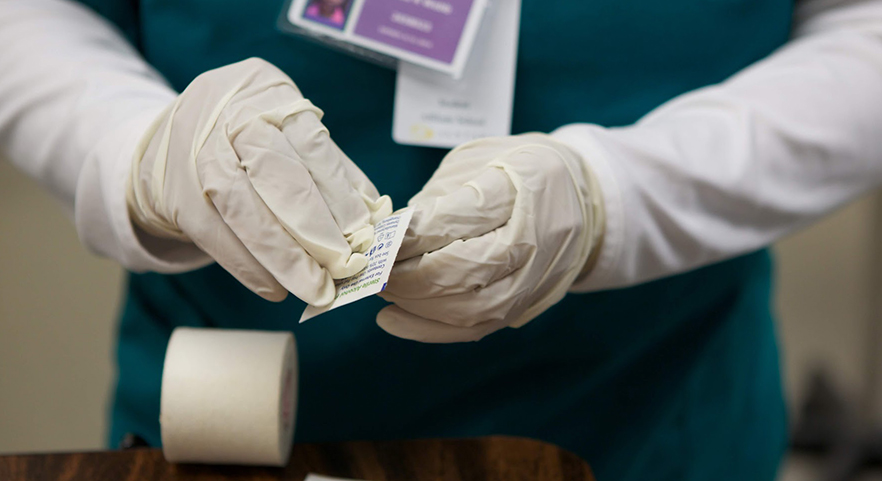Several Workforce Development Programs on Hold

Given the hands-on portions of some health services programs, students in those classes will have to wait a while to graduate.
As challenging as the move to all online classes has been for instructors and students in Thomas Nelson's traditional classes, it's been even more so for those in Workforce Development.
"Probably a good 75% of the skills we need (are) face-to-face, so that's one of our challenges with these programs," said Jonalyn Gore, program coordinator for the Allied Health Human Services division.
Bobby Perkins, director of trades training, said most of his classes are at a standstill because of Gov. Northam's ban on gatherings of more than 10 people. Perkins hopes those classes can restart when the ban, put in place to combat the coronavirus pandemic, is lifted in mid-June.
For ChefsGo, a culinary program where students spend most of the time in kitchens of area restaurants, those classes are suspended until the fall.
In all three cases, lecture and classroom instructions have been moved online where possible.
"For my phlebotomy program, my EKG program, CMA (clinical medical assistant), (we've) tried to put some of the skills online as best as we can," Gore said.
However, she noted many of her students will not be able to complete their courses until they meet the hands-on or in-person requirements, which again, probably won't be until mid-June at the earliest. And even with that, she's not sure how it will work.
"I have a class of 24 for phlebotomy, and I have a class of 20 for CMA, and we're not going to jump off having everybody come back in that type of capacity," she said.
"But they have to complete those skills," she added. "I'm not going to let them finish and be only half-skilled. Those students, unfortunately, are going to be the ones who are on hold until we are able to safely go back on campus."
Medical and health courses that will be offered in the summer are Pharmacy Tech, CMA, and coding and billing. She will have Microsoft IT classes, as well as a class for information security professionals. That latter class will start in June and continue into fall. Also online, she will be offering a personal fitness trainer program, which is done through a third party.
Perkins will be offering HVAC Level I, Electrical Level I and Facilities Maintenance classes, which will begin April 27 with the online curriculum. He hopes by mid-June the governor's restrictions will be lifted and the students can transition into the shop to start the hands-on component of those classes. He's also working to get portions of the CNC Machining class online.
One profession that has an urgent need right now is truck driving. However, all CDL (commercial driver's license) classes also are on hold. Jeff Kraus, assistant vice chancellor for Strategic Communications for Virginia's Community Colleges (VCCS), said a request to the governor's office to continue that training was denied.
"They explicitly said no," he said.
However, he noted those classes could return quickly once given the go-ahead.
"There's going to be continued pressure to get these trucking programs up as fast as we can," he said.
He added what is needed right now are the people who are in community college workforce programs.
"When you look at some of the heroes in this epidemic, it's the healthcare workers, it's the truck drivers. Frankly, it's a lot of the people we train," he said. "We're just not in a position outside of the healthcare workforce right now to continue that training."
One other program under Workforce Development that has been affected is ChefsGo. Robin Carson, one of the coordinators of the program, said the students had just finished the fifth of 13 weeks of classroom and kitchen instruction. That was to be followed by a 15-week paid internship with an area restaurant. For now, it's on hold.
"We contemplated trying to do some online classes, and try to do some things remotely but … this class is a whole lot more than just learning how to do something," Carson said. "You have to feel things, touch the fish and see if it's fresh; smell the garlic as it's sautéing and know when it's ready to go; look at things; be able to hear when something's sizzling enough."
She added there's a lot of teamwork involved in working in a kitchen. She calls it "the language, the rhythm of the kitchen," which you can't learn in a video. The decision was made to suspend classes until chefs and students can get back in the kitchen, which might not be until the fall since they use the facilities at Warhill High School.
However, that doesn't mean the students don't have anything to do until then. They are to continue working on their "Culture and Cuisine" project, which includes a research paper. Carson also wants them to work on their knife cuts, and continue to cook at home.
"They can pull up recipes online and try new things," she said. "That really gets them ready so that when we start the classes in the fall, hopefully, they will have not lost the momentum that they had started."
But she does not want them to do any homework other than their big project.
"We were afraid if they kept doing their reading assignments and answering questions and doing their quizzes, they would forget stuff," Carson said.
Carson also hopes to trim the remainder of the 13-week instructional portion of the program to six weeks. A few field trips might be condensed, and the schedule might go from three days a week to four. With a lot of area restaurants postponing their spring and summer events until the fall, Carson would like to have the students ready for their internships by the end of October or early November.
"That's the idea," she said.
